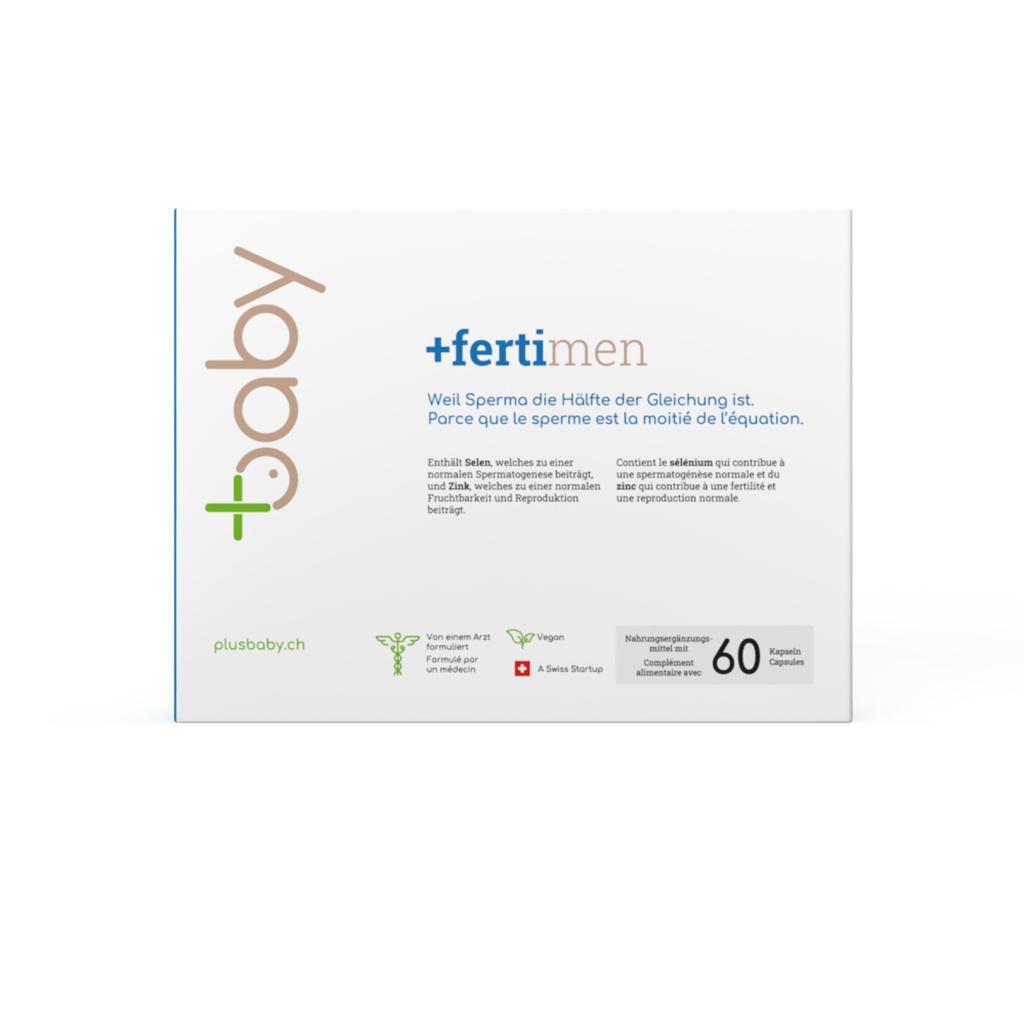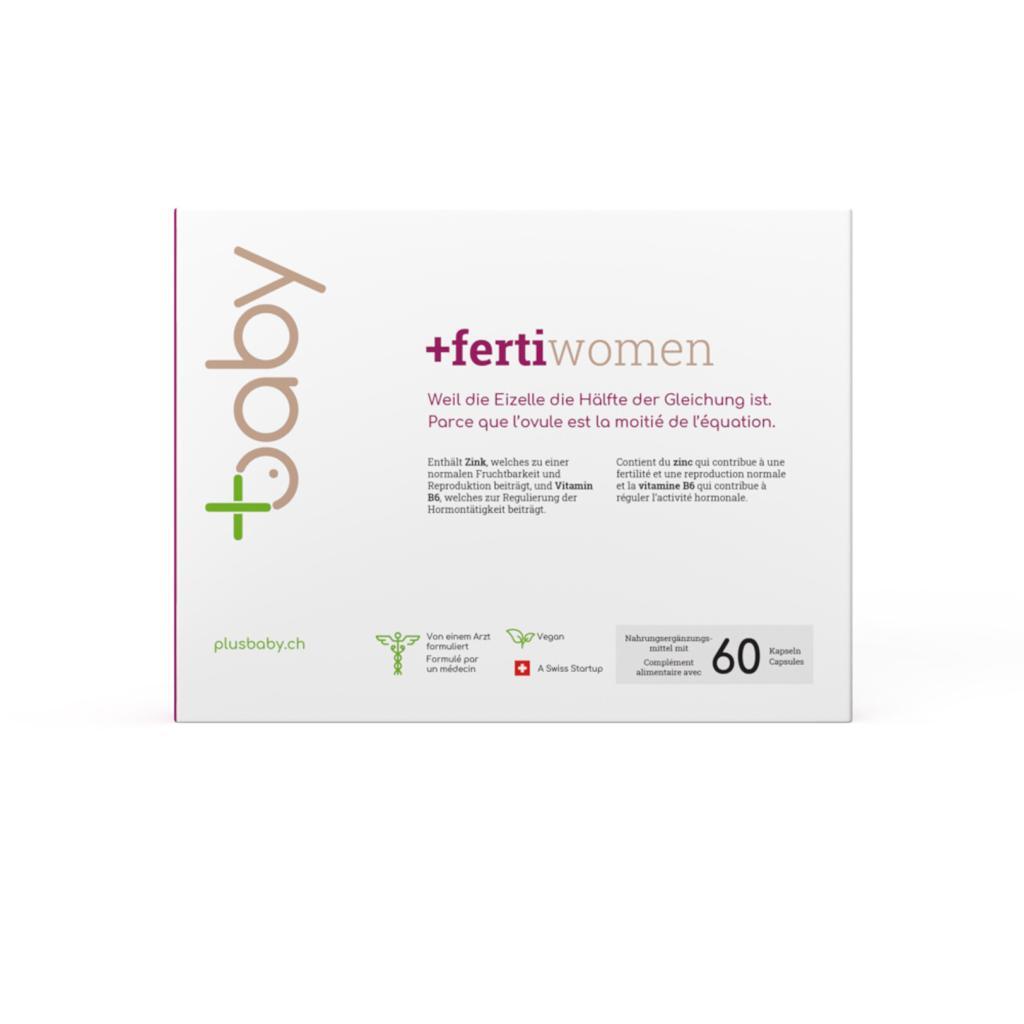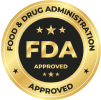🎁Recevez Une Boîte GRATUITE d'Oméga 3 Vegan DHA Pour Toute Commande De Plus De 50 CHF - Visitez Notre Shop !
3 for the price of 2! 🎁 Free delivery on all orders – Visit Our Shop!
Iron plays a crucial role in human health, particularly for women who are pregnant or trying to conceive. This essential mineral, often underestimated, is a fundamental pillar of fertility and healthy foetal development. In this article, we take an in-depth look at the links between iron, dietary supplements and their influence on pregnancy and fertility. Discover Plusbaby’s iron food supplement for pregnancy and fertility

Iron deficiency is a major concern in the world of maternal health, affecting not only the health of the mother but also that of the unborn child. Iron supplementation is often recommended to overcome this deficiency, but it is crucial to understand how the body absorbs this mineral, as well as its interaction with other essential nutrients such as vitamin B12, folates and vitamin C. Iron-rich foods, the different types of supplements, and their impact on the immune system and metabolism are important aspects to consider. In addition, the specific nutritional needs of pregnant women highlight the importance of an adequate intake of vitamins and minerals, underlining the vital role of food supplements in maintaining a healthy pregnancy and promoting fertility.
In the following sections, we will discuss all of these aspects in detail, with particular emphasis on current medical and scientific research, and examine how Plusbaby’s products meet these specific needs, choosing safer and more effective forms of iron for expectant mothers.
Iron, a vital trace element, plays a crucial role in women’s reproductive health, particularly during pregnancy and for fertility. Essential for the synthesis of haemoglobin, iron enables this protein in red blood cells to transport oxygen from the lungs to all parts of the body, including the placenta and the developing foetus. The increase in blood volume during pregnancy requires an increased amount of iron to maintain adequate oxygenation, which is crucial for the health of the mother and the optimal development of the foetus.
Iron deficiency during pregnancy can lead to complications such as poor foetal growth, developmental delay and, in severe cases, premature birth or low birth weight. A good iron reserve is also necessary to reduce the risk of excessive bleeding during and after childbirth, an important factor in maternal health.
In terms of fertility, an adequate level of iron is essential. Iron deficiency can lead to anovulation (absence of ovulation) and can upset the hormonal balance, thus affecting fertility. In addition, adequate levels of iron are necessary for the proper functioning of the endocrine system, which regulates the hormones required for reproduction.
Iron also plays a fundamental role in the immune system. It helps in the formation of immune cells, which are important for protecting both mother and foetus against infection. In addition, iron is involved in several metabolic and enzymatic processes that are crucial for cell development and DNA synthesis, which is essential for foetal development.
Iron deficiency is one of the most common nutritional deficiencies in women, particularly those who are pregnant or of childbearing age. The symptoms of this deficiency may be subtle at first, but can become more severe over time. They include persistent fatigue, weakness, pale skin, headaches, dizziness, or even shortness of breath on minor exertions.
As far as pregnancy is concerned, iron deficiency is a particular cause for concern. It can lead to iron deficiency anaemia, where the body does not produce enough healthy red blood cells. This condition can reduce the oxygen supply to the foetus, which can delay its development and increase the risk of premature birth or low birth weight. It can also weaken the mother, increasing her risk of complications during and after childbirth, such as post-partum haemorrhage.
Iron deficiency can also have a significant impact on mental health, increasing the risk of depression during and after pregnancy. It can also affect concentration and memory, adversely affecting the mother’s quality of life.
Iron deficiency can also have a negative impact on fertility. It can cause irregularities in the menstrual cycle, affecting ovulation and the ability to conceive. Women suffering from iron deficiency may also experience longer and more painful menstrual cycles, which can indirectly affect their fertility.
Early diagnosis and treatment of iron deficiency is therefore crucial, especially for pregnant women or those trying to conceive. Adequate iron intake, whether through diet or supplementation, is essential to ensure a healthy pregnancy and maintain fertility. Health professionals often recommend regular tests to detect iron deficiency and personalised advice on supplementation and diet.
Iron supplementation is a key component of health management, particularly for pregnant women or those trying to conceive. Iron plays an essential role in many biological processes, including the formation of haemoglobin, oxygen transport and support of the immune system. When diet alone is not sufficient to provide the necessary amount of this vital mineral, iron supplements become essential.
There are many different types of iron supplements, each with its own benefits and considerations. The most common forms of iron supplements include ferrous sulphate, ferrous fumarate and ferrous gluconate. These compounds provide a significant amount of elemental iron and are generally the most economical options. However, they can sometimes cause digestive side effects such as constipation or nausea.
Another form of iron supplement is iron bisglycinate, which is often better tolerated and can be more easily absorbed by the body. Although this form can be more expensive, it is generally recommended for people with digestive sensitivities or those who cannot tolerate more traditional forms of iron.
Iron supplementation is particularly crucial for pregnant women, as they have increased iron requirements to support foetal development and compensate for blood loss during childbirth. For women trying to conceive, adequate iron intake can improve fertility and prepare the body for a healthy pregnancy.
The efficiency of iron absorption is significantly influenced by other nutrients in the diet. Some nutrients can improve iron absorption, while others can inhibit it.
Vitamin C is the best known facilitator of iron absorption. It converts non-heme iron (found in plant-based foods) into a form that is more easily absorbed by the body. So eating vitamin C-rich foods at the same time as sources of iron can increase iron absorption. Citrus fruits, tomatoes, berries and peppers are excellent sources of vitamin C.
On the other hand, certain components present in food can inhibit the absorption of iron. For example, phytates, found in wholemeal cereals and legumes, can bind to iron and reduce its absorption. Similarly, the polyphenols found in tea, coffee and certain plants, as well as the calcium found in dairy products, can also reduce iron absorption.
It is important to strike a balance in the diet to maximise iron absorption. For example, by combining sources of iron with foods rich in vitamin C, while limiting the consumption of inhibiting substances at the time of iron-rich meals.
An iron-rich diet is essential for women, particularly those who want to conceive, are pregnant or breastfeeding. Iron is found in two forms in food: heme iron, from animal sources, and non-heme iron, from plant sources. Foods rich in haem iron include red meat, poultry and fish, while plant sources include pulses, fortified cereals, nuts, seeds and certain green leafy vegetables such as spinach.
According to the Swiss Federal Office of Public Health (FOPH), daily iron requirements vary according to a woman’s status. For a woman trying to conceive, it is recommended to consume around 15 mg of iron a day. During pregnancy, this requirement increases to at least around 30 mg a day due to the increase in blood volume and the development of the foetus. For breastfeeding women, the need for iron decreases slightly, but remains higher than for non-pregnant women, with a recommendation of around 20 mg per day.
To meet these needs, incorporating iron-rich foods into every meal is crucial. For example, a meal might include 100 g of red meat (around 2.7 mg of iron), a portion of lentils (6.6 mg per 100 g), accompanied by spinach (3.6 mg per 100 g) and an orange (for vitamin C, which helps iron absorption). Although this meal contains a significant amount of iron, it is important to note that the absorption of non-heme iron from plant sources is less efficient than that of heme iron.
However, it can be difficult to meet daily iron requirements through diet alone, especially during pregnancy. This is due to the increased requirements and variability of iron absorption. In addition, some women may have dietary restrictions or preferences that limit their intake of certain sources of iron.
During pregnancy, iron supplementation often becomes necessary to ensure adequate intake. The recommended forms of iron supplements during pregnancy vary, but the most commonly used are ferrous sulphate, ferrous fumarate and ferrous gluconate. These supplements are not always effective in rapidly increasing iron levels, and can sometimes cause side effects such as gastrointestinal problems.
An alternative is iron bisglycinate, a chelated form of iron that is generally better tolerated and can be more easily absorbed. This can be particularly useful for women who experience side effects with other forms of iron. The recommended dose for supplementation during pregnancy varies, but is generally around 30-60 mg of elemental iron per day, depending on the woman’s iron levels and the advice of her healthcare professional.
It is essential that iron supplementation during pregnancy is monitored by a healthcare professional. An overdose of iron can be toxic and lead to complications for both mother and foetus. Consequently, supplementation must be personalised and adapted to individual needs.
In conclusion, although diet is the primary source to consider in meeting iron requirements, supplementation is often necessary during conception, pregnancy and breastfeeding to ensure adequate levels. This combined approach ensures that iron requirements are met, promoting a healthy pregnancy and optimal development of the foetus.
Although iron supplementation is essential for preventing and treating iron deficiency, it can be accompanied by side effects. The most common include constipation, abdominal pain, nausea and, in some cases, darker stools. To minimise these effects, it is advisable to start with a low dose of iron and gradually increase it, or to opt for forms of iron that are better tolerated, such as iron bisglycinate.
It is also advisable to take iron supplements with food to reduce gastrointestinal irritation, although this may slightly reduce absorption. Drinking plenty of fluids, eating fibre-rich foods and regular physical activity can help prevent or relieve constipation.
Medical supervision is crucial when taking iron supplements. An overdose can lead to serious symptoms, including iron overload, damage to internal organs and, in rare cases, can be fatal. Pregnant and breastfeeding women should always consult a health professional before starting iron supplements.
Iron oxide is a type of iron used in some dietary supplements, including prenatal vitamins. Although generally considered safe, iron oxide has a relatively low bioavailability compared to other forms of iron, meaning that less iron is actually absorbed and used by the body. This can be particularly problematic during pregnancy, when iron requirements are considerably increased.
Supplements containing iron oxide can also cause gastrointestinal side effects, such as constipation and stomach upset, more frequently than other forms of iron. These effects can discourage pregnant women from continuing iron supplementation, potentially leading to deficiency.
For these reasons, many healthcare professionals recommend other forms of iron supplements, such as iron bisglycinate, especially during pregnancy. These forms are generally better absorbed and may be easier to tolerate, reducing the risk of unwanted side effects and ensuring more effective iron supplementation. When choosing fertility supplements or prenatal vitamins, make sure that the iron is in the form of iron bisglycinate. If nothing is marked, it’s probably iron oxide because it’s much cheaper…. So choose one that is transparent in its selection.
Iron bisglycinate is a form of chelated iron, in which the iron is bound to two molecules of glycine, an amino acid. This particular configuration promotes better absorption of iron in the intestine, reducing the gastrointestinal side effects often associated with other forms of iron supplements. Unlike non-chelated forms, iron bisglycinate is less likely to be inhibited by other dietary components and is therefore more effectively absorbed.
Iron bisglycinate is renowned for its high bioavailability, which means that more of the iron ingested is actually used by the body. This increased efficiency often means that the overall dose required to achieve desired iron levels can be reduced, which can be particularly beneficial for people with high iron requirements, such as pregnant women.
Because of its superior gastrointestinal tolerance, iron bisglycinate is an attractive option for those who have had negative experiences with other forms of iron supplements. This form of iron is also suitable for people on restricted diets or for those who prefer a non-constipating form of iron supplement.
Iron bisglycinate has a number of advantages:
Iron bisglycinate and iron oxide are two forms of iron supplement that differ considerably in terms of bioavailability and tolerance. Iron oxide, often used in dietary supplements because of its lower cost, has relatively low bioavailability. This means that the body absorbs a smaller amount of iron in this form, which may not be sufficient to meet increased iron requirements, such as during pregnancy.
In addition, iron oxide is known to more frequently cause gastrointestinal side effects such as constipation and abdominal pain. These effects can make taking it less pleasant and less effective, particularly for pregnant women who are already prone to digestive problems.
Iron bisglycinate, on the other hand, offers much greater bioavailability, ensuring that more iron is absorbed and used by the body. This increased efficacy is accompanied by better gastrointestinal tolerance, making iron bisglycinate more comfortable to take on a regular basis, especially for pregnant women or those suffering from digestive sensitivities.
The benefits of iron bisglycinate extend beyond its high bioavailability and gastrointestinal tolerance. As a chelated form of iron, bisglycinate is less likely to interact with other nutrients, allowing for more efficient absorption of iron, even when taken with food or other supplements.
This form of iron is particularly beneficial for groups at high risk of iron deficiency, such as pregnant women, women with heavy menstrual cycles, and people following a vegetarian or vegan diet. For these groups, iron bisglycinate offers a more direct and easily usable source of iron, helping to prevent the complications associated with iron deficiency, such as iron-deficiency anaemia and chronic fatigue.
In addition, iron bisglycinate is often recommended for people with a history of gastrointestinal problems associated with taking iron supplements. Its gentle stomach formula makes it more comfortable to take over a prolonged period, which is essential to ensure long-term adherence to iron deficiency treatment.
In conclusion, iron bisglycinate represents an advantageous iron supplementation option, combining effective absorption with superior tolerability, making it suitable for a wide variety of individual needs and preferences.
Plusbaby is a company that focuses on supporting women and women’s fertility and during preconception, pregnancy and the postnatal period. They develop products and resources based on the latest scientific and medical research into fertility and pregnancy. Plusbaby stands out for its scientific rigour in the formulation of its supplements, choosing minerals and vitamins with high bioavailability and nutrients with fewer undesirable side effects. Their commitment to quality and the use of natural and vegan ingredients is a cornerstone of their identity.
As part of their product range, Plusbaby includes iron bisglycinate in all their food supplements containing iron: +fertiwomen, a food supplement for women’s fertility, and +mum, prenatal vitamins for pregnancy, breastfeeding and the postpartum period. The choice of iron bisglycinate instead of iron oxide is deliberate because of its many advantages. Iron bisglycinate has a very low molecular weight, making it highly absorbable by the body. Unlike iron oxide, bisglycinate is electrically neutral and is unaffected by stomach acid, which means it is better absorbed.
Plusbaby eliminated the use of iron oxide or iron sulphate, common in other prenatal vitamins, and opted for iron bisglycinate because of its very low acidity, which reduces the risk of intestinal problems and other side effects. In addition, iron chelated to an amino acid avoids inhibitors that can reduce its effectiveness in the body. This approach demonstrates Plusbaby’s commitment to providing products that are not only effective but also comfortable and safe for women during these crucial stages of their lives.
The combination of these elements makes Plusbaby products, in particular +fertiwomen and +mum, wise choices for women looking to optimise their fertility and support their health and that of their baby during pregnancy, breastfeeding and beyond. By choosing iron bisglycinate, Plusbaby is demonstrating its commitment to innovation and quality, offering supplements designed to meet women’s specific needs while minimising unwanted side effects and maximising iron absorption and effectiveness.


Recent research into iron supplementation, in particular iron bisglycinate, for pregnancy and fertility has shed significant light. A randomised controlled trial examined the bioavailability, efficacy and safety of oral iron bisglycinate plus folinic acid supplementation in pregnant women with iron deficiency. This study revealed that iron bisglycinate, even at a lower dose of elemental iron, was as effective as ferrous fumarate, a more common form of iron supplement, in increasing levels of iron and other haematological biomarkers. In addition, women who received iron bisglycinate reported fewer side effects such as nausea, abdominal pain, bloating, constipation or a metallic taste.
In addition, a systematic review and meta-analysis studied the impact of maternal iron status during pregnancy on the long-term health of children after birth. Although the results were heterogeneous, it emerged from these studies that low maternal iron status or iron deficiency was associated with unfavourable outcomes in children, particularly in terms of neurological development. This review highlights the need for further studies to define iron deficiency and iron overload during pregnancy in a clinically meaningful way.
This research underlines the importance of adequate iron supplementation during pregnancy, not only for the health of the mother, but also for the long-term development of the child. Iron bisglycinate is emerging as a promising option, offering both high bioavailability and improved tolerability, which could make it a preferable choice in the management of iron deficiency during pregnancy.
These references provide crucial information on the latest research into iron supplementation, particularly iron bisglycinate, for pregnant women and its impact on child health after birth.
In summary, the importance of iron for reproductive health, particularly during pregnancy and the fertile period, cannot be underestimated. Iron deficiency, a major public health problem, can have adverse effects on both mother and unborn child, underlining the importance of adequate supplementation. Choosing the right type of iron supplement is crucial, and iron bisglycinate stands out as a superior option, offering better bioavailability and fewer side effects than other forms of iron.
At Plusbaby, we understand these issues and have incorporated iron bisglycinate into our +fertiwomen and +mum products. These supplements are designed to meet the specific needs of women at different stages of their fertility and maternity journey, providing highly absorbable and well-tolerated iron. Our commitment to the quality, efficacy and safety of our products reflects our dedication to supporting women’s health and well-being.
We invite you to choose Plusbaby for iron supplementation that not only meets nutritional needs during pregnancy and fertility, but does so safely, effectively and comfortably. With Plusbaby, you’re doing more than just adding a supplement to your daily diet; you’re choosing a trusted partner on your journey to healthy, fulfilling motherhood.




PlusBaby resources are intended to provide general information and are not a substitute for professional medical advice, diagnosis or treatment.
Stay connected with Plusbaby. Sign up for a free e-book to understand your menstrual cycle and help you identify your most fertile period. You’ll also get early access to offers.
Who we are



@ 2025 by Plusbaby
@ 2025 by Plusbaby
